- Home
- Anthony Ryan
Queen of Fire Page 6
Queen of Fire Read online
Page 6
She nods and waits for him to say more but the Council-man fixes a mask on his face and stays silent. “The Ally wishes you to elevate me to Council,” she tells him. “The Slaver’s Seat.”
“That is Council-man Lorvek’s seat,” he protests. “One he has discharged with care and diligence for near a century.”
“Lining his pockets and failing to breed enough Gifted in the process. The Ally feels his guidance has not been fully appreciated. And with our new assets coming to maturity, he feels I would offer a more trustworthy overseer for this very particular enterprise. If Lorvek won’t step down, I’m sure ample evidence of corruption will be found to justify a charge of treason. Unless you prefer a quieter method.”
He says more but she doesn’t hear him, feeling time slip away once more. How long has she stood here? When the confusion fades she is alone again and the sky is a darker shade of blue. She turns her sight to the west, tracking the broad estuary to the coast and the ocean beyond. Please hurry to me, beloved. I am so very lonely.
CHAPTER FOUR
Reva
She had seen enough corpses to know the dead rarely retained expression. The rictus smiles and fear-filled grimaces merely the tightening of sinew and muscle as the body’s humours drained away. So it was a surprise to find the priest’s face such a picture of serenity; but for the deep narrow cut in his throat he could easily have been mistaken for a slumbering man, his features betraying a soul content with the world.
Content, she thought, moving back from the corpse to rest on her haunches. How fitting he should only find peace in death.
“This is him?” Vaelin asked.
She nodded and rose as Alornis came to her side, touching her hand in reassurance. Vaelin held up his sister’s sketch, eyes switching from the priest’s face to the rendering on the parchment. “What a talent you have,” he told her with a smile before turning to the hulking man standing near the tent wall. “And you, Master Marken. Quite the eye for detail.”
Marken’s beard constricted with a brief smile and Reva noted how tightly his hands were gripped together, and his staunch refusal even to look at the second corpse. It lay alongside the priest, the features more typical of Reva’s experience, the skin a pale blue, the lips drawn back and the tongue protruding from the bared teeth, part severed by his death rattle. However, as with the priest his features were sufficiently recognisable to match Alornis’s sketch.
“Uncle Sentes said his name was Lord Brahdor,” she told Vaelin. “Lady Veliss tells me he owned land a little east of here, good vines. More renowned for white than red.”
“That’s all?” Vaelin asked. “No suspicions? Tall tales of strange powers or unexplained events?”
“That’s all. Just a minor noble with a few hundred acres of grapes … and a barn.”
Vaelin looked expectantly at Marken. The big man gritted his teeth for a moment then pointed a thick finger at Lord Brahdor’s corpse, still refusing to look at it. “This one I’ll not touch, my lord. I can feel it, seeping out of him like poison. Forgive my cowardice. But…” He shook his shaggy head. “I can’t. I…”
“It’s all right, Marken,” Vaelin assured him, nodding at the priest. “And him?”
Marken huffed a relieved sigh and turned to crouch beside the priest, rolling up his sleeve and placing a meaty hand on the corpse’s forehead. After a moment he winced as if in pain, his mouth twisting in disgust as it seemed he was about to draw his hand away, but she saw him stiffen his resolve, closing his eyes and maintaining a statuelike stillness for several minutes. Eventually he exhaled a long slow breath, sweat shining through the mass of hair that hung over his heavy brow. He rose, his gaze resting on Reva, warm with sympathy and sorrow. “My lady…” he began.
“I know,” she told him. “I was there. Master Marken, please tell Lord Al Sorna all you saw.”
“His early years are confused,” Marken said to Vaelin. “It appears he was raised in the Church of the World Father. There are no images of his parents so I judge him an orphan, apprenticed to a priest, a common fate for Cumbraelin orphans I believe. The priest who raised him was kind, a former soldier in the Lord’s guard, called to the church in later life, keen for his charges to acquire both his martial abilities and the fierceness of his devotion. The boy spent long years steeped both in study of the Ten Books and training for war. In manhood he endured long years of shame when he looked at women. The younger the woman, the greater the shame, and the more he looked. I sensed a compulsion to hide in the Ten Books, to find refuge from his desires in the church’s teachings.
“Alltor and the cathedral loom large in his memory and I believe he was sent there in preparation for priesthood. I saw him meet the Reader and receive his priestly name. They never met in public and I sensed the priest had been chosen for a secret role. I saw a journey away from Alltor halting when he finds a man with a scar, here.” Marken paused to touch his cheek. “The man is speaking before a large crowd and the young priest burns with new passion on hearing his voice. He returns to the Reader and is sent forth again. Then there are many months of meetings in dark rooms and secluded hollows, men clustering together and fearful of discovery as they pass letters and gather weapons in hidden caches. He never sees the scarred man again but the memory comes to him often. Then at another hidden meeting he finds this thing.” Marken nodded at the second body, grimacing as his gaze touched Brahdor’s dead face. “It talks, the words are lost to me as you know, my lord. But they make his passion burn even brighter. The thing leads him to a farmhouse at night, inside an old couple sit before a fire fussing over a little girl.” He looked again at Reva and swallows. “The priest’s shame is deeper than ever when he looks at her.”
“They killed my grandparents, didn’t they?” Reva asked. “They killed them and they stole me.”
He nodded. “They waited until you had been put to bed. The old couple were killed, the girl stolen from her bed, the farmhouse burned.”
“And then many happy years in a barn,” Reva muttered as Marken fumbled for the right words to say.
“Any names?” Vaelin asked the Gifted.
“A few, my lord. The priest would write them down to memorise. He would burn the paper but the memories remain.”
“Make a list and give it to Lady Reva.”
She moved back to the priest’s corpse, feeling a great temptation to smash her boot into his contented face, spoil his slumber forever. “Reva,” Alornis said, tugging at her sleeve. “There’s nothing more to learn here.”
“I…” Marken stammered. “I do have his name, my lady. The Reader wrote it down when he gave it to him.”
“No,” she said, turning to walk to the tent flap. “Burn it if you’re done,” she told Vaelin. “No words are to be spoken for him.”
“My lord,” Marken continued as they made to the leave. “If I may. About Brother Caenis…”
“I’m aware of the matter, Master Marken,” Vaelin told him.
“We didn’t follow you here to become servants of the Faith…”
“We’ll discuss it tonight,” Vaelin told him in a level voice. “With Lord Nortah. Your concerns are fully noted.”
They walked in silence back to the causeway, Reva preoccupied with the Gifted’s tale, Vaelin no doubt pondering Brother Caenis’s revelation to the queen. Alornis followed at a discreet distance, eyes scanning the city walls and her ever-present leather-bound bundle of sketches clutched to her chest, already filling up with renderings of the destruction behind the walls. She had cried the day she found Reva standing amidst the corpse-littered streets. Upon seeing her, Alornis had thrown her arms around Reva, convulsing with relief, provoking an old ache that Reva found didn’t pain her in quite the same way.
“The Seventh Order,” she said to Vaelin as they halted before the causeway. “Not a legend after all. But, I suppose you’ve known that a while.”
“Yes.” His face was sombre, not quite so fatigued as it had been recently, but still he seemed
to have aged much in a few days. “Though there was something I should have known, but didn’t.”
“Brother Caenis?”
He nodded and changed the subject. “What will you do with the names Marken gives you?”
“Hunt them down and subject them to trial. If they are proved to be Sons, I’ll hang them.”
“My Lady Governess favours harsh justice.”
“They plotted the death of my uncle, with the full contrivance of the church that has compelled the people of this fief to servile respect for centuries. They conspired with foul creatures of the Dark to subject me to a lifetime of abuse before sending me after you in the hope I would die. And let’s not forget their attempt to kill our queen. Must I go on?”
He studied her face for a moment and she felt the harshness of her expression soften under the scrutiny. “I’m sorry for everything that happened to you here, Reva. If I had had any inkling…”
“I know.” She forced a smile. “Join us tonight. Veliss found a new cook, though we can offer only two courses, and no wine.”
“I can’t. There is much to do.” He glanced back at the camp where soldiers were busy packing gear and supplies in preparation for tomorrow’s march and the commencement of what was fast becoming known as the Queen’s Crusade.
“She wanted me to ask,” he said, turning back, “how many men you will send with us.”
“I’ll not be sending any. I’ll be leading them, the full House Guard plus five hundred archers.”
“Reva, you have done enough…”
Arken’s slack, lifeless face, the sword in his back … The archers flailing in the river as the arrows lashed down … Uncle Sentes dying on the cathedral steps … “No,” she said. “No I haven’t.”
Veliss came to her somewhere past midnight. They had reverted to keeping separate rooms in the aftermath of the siege, more at the Lady Counsellor’s insistence than hers. Their numerous indiscretions might have been overlooked in the storm of daily battle, but the city had begun to resume a strange normality now the corpses and the worst of the rubble had been cleared away, and the cathedral reopened.
“Are you sure you want to meet them alone?” Veliss asked. They lay side by side, covered in a faint sheen of sweat, Reva enjoying the feel of the Lady Counsellor’s unbound hair clinging to her skin.
“They need to know I speak with my own mind,” she replied. “Given what I have to tell them.”
“They won’t like it…”
“I should hope so.” She pulled Veliss closer, pressing a kiss to her lips to forestall further discussion.
“Lady Alornis,” Veliss said, a while later. “You care for her.”
“She is a friend to me, like her brother.”
“No more than that?”
“Jealous, Honoured Counsellor?”
“Trust me, you don’t want to see me jealous.” She raised herself up, hugging her knees. “I was always going to leave, you know. When the war was done, if your uncle had lived. Take the gold he offered and go. Never cared about all the names they called me, or the Reader’s sneering condescension. But I was getting tired of it all, the lies and the intrigue. Even for a former spy, it can grow wearisome.”
Reva reached out to stroke her naked back. “And now?”
“Now I can’t imagine being anywhere else.” Reva felt her tense in anticipation of her next words. “The Queen’s Crusade…”
“Is my crusade. And not a topic for discussion.”
“Do you think she would be so welcoming if she knew your true nature? If she knew about us?”
“Unless it proved an impediment to liberating this Realm, I doubt she would care one whit.” She recalled her first meeting with the queen, the fierce intelligence shining through the seared mask of her face, and the implacable determination, the singularity of purpose Reva recognised from infrequent youthful glances at her own reflection. But I was sent in search of a myth, she thought. Her quarry is all too real, and I doubt she’ll be satisfied with however many we find at Varinshold. “In truth,” she confessed to Veliss, “that woman scares me more than the Volarians ever did.”
“Then why follow her?”
“Because he does. He tells me this is necessary. I once failed to heed his words, I’ll not make the same mistake again.”
“He’s just a man,” Veliss murmured, although Reva could hear the uncertainty in her voice. The tale was on every set of lips, Cumbraelins as enraptured by it as all the others, flying far and wide with every telling. One man, cutting his way through an army to save a city, and living to tell the tale.
Living? Reva remembered how his features had sagged that day, her tears and the pounding rain washing the blood away as she screamed at him to stay with her. But he hadn’t, she had seen it plainly. For those few seconds, he had not been in his body.
“I’ll need you to take care of things while I’m gone,” she said. “Rebuild as best you can. I’ll leave Lord Arentes here as surety of my word, though no doubt he’ll hate me for it. How about a new title? Vice-Governess, maybe? I’m sure you can come up with something better.”
Veliss hugged her legs tighter. “I don’t want titles, I just want you.”
Lords Arentes and Antesh preceded her into the cathedral, striding through the cavernous interior towards the Reader’s chambers as she followed with twenty of the House Guard at her back. The two priests standing guard at the chamber door were subdued without particular difficulty, Lord Arentes thrusting the doors open and standing aside to allow her entry. Reva paused at the sight of the priest held to the wall by Lord Antesh, a sallow-faced man with a heavily bandaged hand and misshapen nose.
“I never learned your name,” she said.
The priest scowled and said nothing until Antesh gave him a none-too-gentle shake. “My name is for the Father alone.”
“And I believe he wants you to share it.” She beckoned two guards forward. “Take this one to Lady Veliss. Tell her I think he would benefit from some herbal medicine.”
She turned back to the open door as they hustled the priest away, entering at a sedate pace and offering a brisk greeting to the seven old men she found seated at a circular table. “Good bishops!” There were supposed to be ten but three had perished in the siege, not, she suspected, by virtue of any courageous act.
One of the bishops struggled to his feet as she walked to the only empty chair at the table, a wizened and bird-like man she recalled had objected when she gave the cathedral over to the care of the wounded. “This is the holy conclave of the ten bishops,” he sputtered. “You are not permitted…”
He fell silent as Lord Arentes brought a gauntleted fist down hard on the table. “The correct form of address for the Lady Governess,” he told the quailing cleric, “is ‘my lady.’ And no door in this city is barred to her.”
Reva paused at the empty chair, naturally the most ornate in the room with an ample cushion for the old bastard’s bony behind. She sighed and pushed it out of her way. Can’t kill him twice, more’s the pity.
“Now, now, my Lord Commander,” she told Arentes. “We should respect the good bishops’ privacy. Leave us, for we have much to discuss.”
They sat in dumb silence as the doors closed with an echoing boom. She waited for it to fade before speaking, all vestige of respect stripped from her tone. “So, have you chosen?”
Only one spoke up, a slight man with a prominent nose, a little younger than his colleagues. “We had not yet counted the ballots, my lady.” He indicated a plain wooden box in the centre of the table.
“Then do so now.”
Reva studied him closely as he reached for the box, finding she remembered his face from the day the Reader died, one who smiled when she charged the old man. A possible ally? She steeled her thoughts against the suggestion; Marken’s revelations left no room for accommodation. I have no friends in this room.
“The Bishop of the Southern Parish,” the thin bishop reported after counting the ballots. “By unanimou
s assent.”
Reva scanned the faces around the table, finding six scared old men and one sleeping ancient who hadn’t raised his head since her entry. “Who is?” she enquired.
The thin bishop cleared his throat in discomfort. “I am, my lady.”
She gave a short laugh and turned her back on him, her gaze drawn to a candlelit alcove at the rear of the chamber where ten large tomes sat on lecterns. The books were ancient, the bindings flaking and cracked with age. The first to be bound in the land of Cumbrael, she knew, finding it odd that she felt no upswelling of awe at the sight. Just a collection of old books in a room of old men.
“I have in my possession,” she said, turning back to the table, “what I believe to be a complete list of adherents to the heretical sect known as the Sons of the Trueblade. In due course each and every name on this list will be captured and put to the question. I am sure you will join me in rejoicing at this news, given the wealth of intelligence they are sure to provide.”
She scanned each face in turn, finding confusion on most, but fear on others. They knew, she realised. Not all, but some. She saw how the Bishop of the Southern Parish avoided her gaze, a few beads of sweat forming on his wrinkled brow. Him in particular. She was right; there were no allies here.
She walked slowly around the table, watching each stooped back flinch as she passed by. She wore no weapons today, having returned her grandfather’s sword to its place in the library, but had little doubt she could snap every neck in this room should she choose. She halted behind the chair occupied by the Reader-elect and pointed at the ballots neatly piled at his side. “Give me those.” His spotted, bony hands trembled as he complied, dropping the ballots and scrambling to retrieve them before managing to fumble them into her palm.
“‘Deception is both sin and blessing,’” she quoted as she took the ballots from him, the Fifth Book, the Book of Reason, fast becoming her favourite. She turned and walked slowly back to the alcove, ballots in hand. “‘The paths set for us by the Father are many and their course is ever winding. At every turn the Loved find themselves presented with a plethora of choices as their paths fork, split by war or famine, love and betrayal. To walk the varied paths of life without deception is impossible.’” She stopped before the alcove, holding the ballots to one of the candles, letting the flame consume half their length before tossing them onto the stone floor where they continued to burn, soon no more than a swirl of black cinders.

 Raven’s Shadow Book One: Blood Song (Raven's Shadow)
Raven’s Shadow Book One: Blood Song (Raven's Shadow)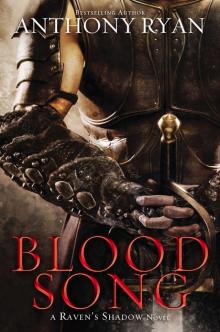 Blood Song
Blood Song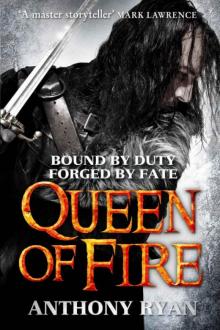 Queen of Fire
Queen of Fire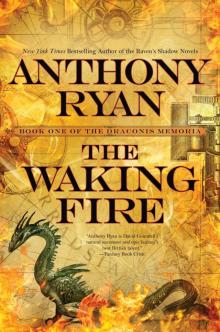 The Waking Fire
The Waking Fire The Legion of Flame
The Legion of Flame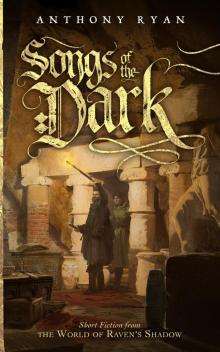 Songs of the Dark
Songs of the Dark Sandrunners--A Draconis Memoria Short Story
Sandrunners--A Draconis Memoria Short Story Slab City Blues
Slab City Blues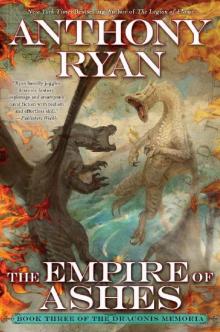 The Empire of Ashes
The Empire of Ashes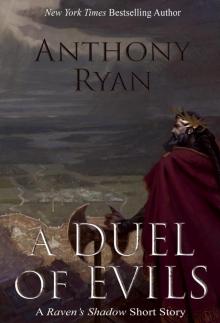 A Duel of Evils
A Duel of Evils The Pariah
The Pariah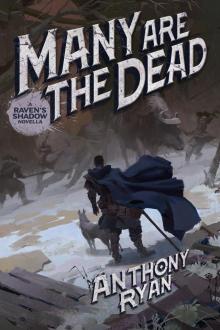 Many Are the Dead
Many Are the Dead The Wolf's Call
The Wolf's Call Tower Lord (A Raven's Shadow Novel)
Tower Lord (A Raven's Shadow Novel)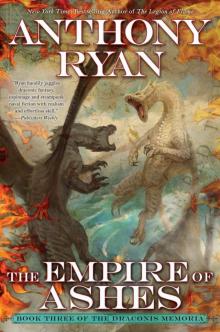 The Empire of Ashes (The Draconis Memoria)
The Empire of Ashes (The Draconis Memoria) The Legion of Flame (The Draconis Memoria)
The Legion of Flame (The Draconis Memoria) Slab City Blues: A Song for Madame Choi
Slab City Blues: A Song for Madame Choi